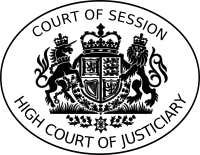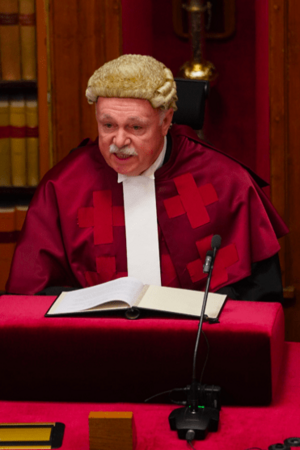Lord President of the Court of Session facts for kids
Quick facts for kids Lord President of theCourt of Session and Lord Justice General of Scotland |
|
|---|---|

Logo of the Lord President of the Court of Session
|
|
| Style | The Right Honourable |
| Appointer | Monarch on the advice of the First Minister |
| Term length | Life tenure with compulsory retirement at 75 |
| Inaugural holder | Alexander Mylne, Abbot of Cambuskenneth |
| Formation | 1532 |
| Deputy | Lord Justice Clerk |
| Salary | £222,862 (Salary Group 1.1) |
| Website | Roles and Jurisdiction | Judicial Office for Scotland |
The Lord President of the Court of Session and Lord Justice General is the most important judge in Scotland. This person leads all the judges in Scotland. They are also in charge of the College of Justice, the Court of Session, and the High Court of Justiciary.
The two jobs, Lord President and Lord Justice General, were joined together in 1836. This means the Lord President is also the head of the High Court of Justiciary. The Lord President oversees almost all courts in Scotland. The only exceptions are the Supreme Court of the United Kingdom and the Court of the Lord Lyon.
The person holding this important role right now is Lord Pentland. He started this job on February 3, 2025. He took over from Lord Carloway.
Contents
What the Lord President Does
Leading Scotland's Judges
The Lord President of the Court of Session is the top judge in Scotland. They are the leader of all judges in the country. They also lead the College of Justice and the Court of Session. The Lord President has power over most courts set up under Scottish law. This does not include the Supreme Court of the United Kingdom or the Court of the Lord Lyon.
A special office called the Judicial Office for Scotland helps the Lord President. This office was created in 2010. The Lord President also leads the board of the Scottish Courts and Tribunals Service. There is also a group called the Judicial Council for Scotland. This group gives advice to the Lord President and other judges.
The Inner House
The Lord President is in charge of the First Division of the Inner House. The Inner House is a part of the Court of Session. It acts like an appeals court. This means it reviews decisions made by other courts. These courts include the Outer House and the Sheriff Appeal Court. It also hears appeals about legal questions from other courts. These are the Scottish Land Court, the Court of the Lord Lyon, and the Lands Tribunal for Scotland.
Taking an Oath
In Scotland, new officials take an important promise called the Official Oath. This promise is made in front of the Lord President of the Court of Session.
The Lord Justice General Role
The Lord President also holds the title of Lord Justice General of Scotland. This role is the head of the High Court of Justiciary. These two jobs were combined in 1836. The job of Lord Justice General comes from very old judges called "justiciars." These judges were around since at least the 1100s.
Important People in This Role
Over many centuries, many important people have held these positions. They helped shape the legal system in Scotland. The roles of Justiciar, Lord Justice-General, and Lord President have been held by various individuals. These leaders have guided justice in Scotland for a very long time.
Images for kids
 | Sharif Bey |
 | Hale Woodruff |
 | Richmond Barthé |
 | Purvis Young |




